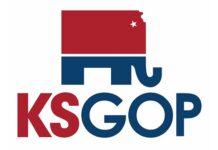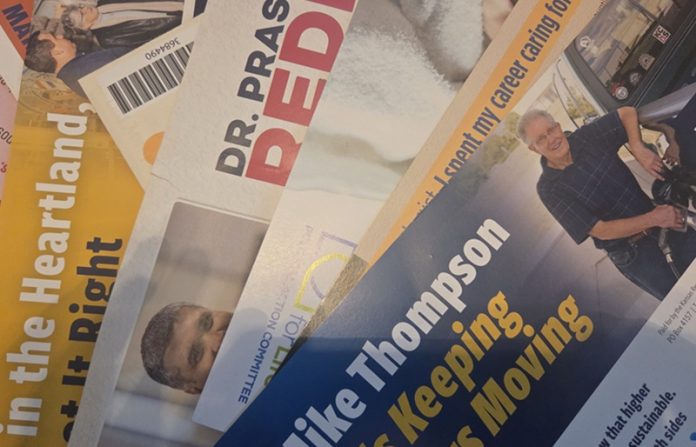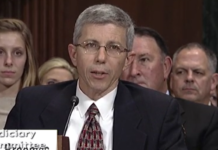Kansas lawmakers want to clean up state politics, looking to find a way to keep false and slanderous ads out of campaigns.
The Special Committee on Campaign Contributions and Transparency recommended last week that the Legislature increase scrutiny of false political advertising.
“I don’t think it’s right all these campaigns here locally and nationally have gotten so bad,” said Republican state Rep. Shawn Chauncey, a committee member from Junction City.
“Instead of running on your merit and what you plan on doing, we run on trying to belittle the other person with lies and misleading information,” Chauncey said in an interview.
“I think that needs to stop,” he said.

Chauncey raised the issue last week when the special committee discussed ways to make changes to campaign finance law.
Chauncey said when he ran for office in 2024, he was wrongly labeled as a candidate who opposed abortion outright even in the case of rape or incest.
Notably, there was one ad with Chauncey’s name on a tombstone, saying he supported criminalizing maternal care and banning abortion.
“How many more women have to die” read the headline on the ad.
He said ads claiming he wanted to require women who had been raped or were a victim of incest to carry a pregnancy to term were an “outright lie.”
“I’m a 100% advocate for free speech,” he said. “But when you outright lie, it’s not free speech because you’re ruining someone’s reputation by telling a lie.”
Just how that will be accomplished is still unclear.
Republican state Sen. Mike Thompson of Shawnee, chair of the special campaign finance committee, said he didn’t know what the Legislature could do about the issue.

“I think we need to figure out if there’s a way to go after bad actors that are disseminating blatantly false information,” Thompson said.
“There are a lot of gray areas in these campaigns,” he said. “I don’t know how you fix it. I know it’s a concern for a lot of people.”
Thompson said he has a thick skin. He said he’s learned to live with critical campaign ads and do what he can to fight back.
“I don’t know if there’s anything we can do, but we can at least look at the problem, I think,” Thompson said in an interview.
Thompson acknowledged that it could be a sticky issue to address, adding that there will be plenty of debate over the topic.
“I’m not sure how you approach that,” he said. “We can look at it. We could have another informational hearing or something like that.
“I don’t know that there’s a solution to it,” he said.
Republican state Rep. Pat Proctor of Leavenworth, chair of the House elections committee, doubted the Legislature would consider the issue because of constitutionality questions.
Democratic state Rep. Alexis Simmons of Topeka, also a member of the special committee, said while the idea may have merit in the abstract, she questioned how it would work in practice.
“In theory, I think it’s a great idea,” Simmons said.

“Campaigns should be truthful, we all agree on that. Beyond that, it gets pretty murky. It comes with a lot of questions, like who would report suspected infractions? Would there be a partisan at the helm of enforcement?”
“Would alleged infractions go through a court process? If it’s a board or commission structure, how do we ensure the oversight remains insulated from partisan weaponization or financial interference?
“Would there be an appeals process? Could this law stymie assertive speech over litigation fears?” she asked.
She questioned how a law banning lies in political ads would apply when candidates are labeled as “homophobic,” “misogynistic” or “racist.”
Constitutional law experts are skeptical about any attempt to regulate election speech.
Jeff Jackson, who teaches constitutional law at Washburn University, said the U.S. Supreme Court has not directly addressed the issue.
But in 2012, the court struck down the Stolen Valor Act, which made it a crime to falsely claim military decorations or medals because it infringed on the First Amendment.
“What they said was that false speech, even false political speech, was still speech and entitled to protection,” Jackson said in an email.
“Thus, any law that criminalizes ‘false’ political speech has to pass strict scrutiny. This has led to a number of lower court cases striking down these laws, although no Supreme Court case addresses them directly,” he said
Nevertheless, Jackson said there’s a distinction between falsehoods expressed as political views and other false statements.
Advertising that affects the political process, such as ads that misstate the time of the election, or how to vote, or the consequences of voting can be regulated, he said.
Further, ads that misrepresent who a person is – implying a person is the incumbent, for instance – can also be regulated.
Finally, political ads can still be subject to laws regarding libel or slander, he said.
University of Kansas constitutional law professor Richard Levy said the government didn’t have broad authority to regulate political speech.
“Just because speech is false or slanderous does not mean that the government may prohibit it, especially because political speech is in need of especially robust protection,” Levy said in an email.
“So, for example, even false speech about public figures cannot be the basis for a libel action unless the false statements are made with ‘actual malice,'” Levy said, alluding to the legal standard requiring a plaintiff to prove someone made a statement with knowledge that it was false or with reckless disregard for the truth.
“Likewise, the court has declined to conclude that speech is unprotected just because it is false,” he said. “In addition, even regulations that target protected speech are invalid if they are vague or overbroad.
“So, the government at any level has very limited authority to regulate the content of campaign advertising and most laws that attempt to do so are invalid,” he said.
Chauncey said that if it’s illegal to lie under oath in court, why would it be legal for someone to lie campaigning for office.
“I don’t think it’s just a Republican or Democrat thing. I think it’s universal,” Chauncey said of the desire to keep lies out of political ads.
“We have to somewhere start setting a set of parameters,” he said.
“We just can’t let it continue to go because pretty soon you’re going to say I’m a rapist, murderer, whatever, and it’s going to be OK to say that even if it’s easily proven I’ve not been found guilty of any of that.”















